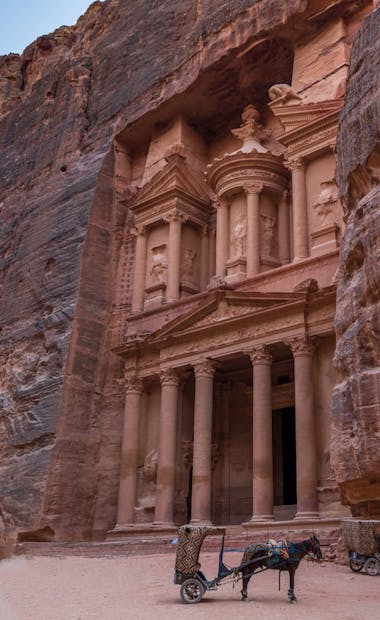
Jordan Tours
Discover the rugged beauty and explore the Majestic UNESCO world heritage site
Popular tours
- Save16%
 View Tour
View TourHighlights of Jordan - 8 Days
- Amman to Amman
- Age group: 12 - 100
- Max group size: 16
Was:£1,129From£950 - Save31%
 View Tour
View TourJourneys: Explore Jordan - 8 Days
- Amman to Amman
- Age group: 12 - 100
- Max group size: 16
Was:£2,179From£1,510 - Save16%
 View Tour
View TourJordan Discovery - 8 Days
- Amman to Amman
- Age group: 15 - 99
- Max group size: 12
Was:£1,640From£1,380 - Save16%
 View Tour
View TourPremium Jordan - 8 Days
- Amman to Amman
- Age group: 15 - 99
- Max group size: 12
Was:£2,395From£2,015 - Save11%
 View Tour
View TourExplore Jordan - 8 Days
- Amman to Madaba
- Age group: 15 - 99
- Max group size: 14
Was:£1,175From£1,047 - Save16%
 View Tour
View TourJordan Family Holiday - 8 Days
- Amman to Amman
- Age group: 5 - 99
- Max group size: 16
Was:£1,550From£1,304
Jordan Tours
Embark on an unforgettable journey to Jordan, a captivating land of ancient wonders and natural marvels. With our tailor-made Jordan tours and holidays, immerse yourself in a land where history comes alive, vibrant cultures converge, and breath-taking landscapes unfold at every turn. Whether you seek a thrilling adventure, a cultural exploration, or a serene escape, Jordan has it all. Get ready to unlock the treasures of this enchanting destination, as we unveil its main attractions and reveal why it deserves a coveted spot on your travel bucket list.
Step into the mythical city of Petra, a UNESCO World Heritage Site and one of the New Seven Wonders of the World. As you traverse the narrow Siq, a mesmerizing rock fissure, be prepared to be awestruck as the ancient city emerges before your eyes. The iconic Treasury, carved into the rose-red cliffs, stands as a testament to the brilliance of the Nabataeans, who constructed this architectural masterpiece over two millennia ago. Explore the intricately carved facades, temples, and tombs, and let the mystique of Petra envelop your senses.
Venture into the lunar-like landscapes of Wadi Rum, a desert wilderness that has enchanted travellers for centuries. Embark on an exhilarating 4x4 excursion through this otherworldly terrain, where towering sandstone cliffs blend with the warm hues of the desert sands. Witness stunning rock formations, centuries-old inscriptions, and the vast expanse of the desert as you experience the captivating beauty of Wadi Rum.
Indulge in the healing powers of the Dead Sea, the lowest point on Earth. Float weightlessly in its mineral-rich waters, renowned for their therapeutic properties. Allow the mud to caress your skin, rejuvenating and leaving you refreshed. Bask in the warm sun, surrounded by the stunning landscape of this unique saltwater lake, offering a once-in-a-lifetime experience.
For history enthusiasts, a visit to the ancient Roman city of Jerash is a must. Explore its remarkably preserved ruins, where magnificent temples, colonnaded streets, and grand amphitheatres paint a vivid picture of Roman life in the past. Wander through the well-preserved archaeological sites, where the echoes of history whisper in the breeze, and let the timeless allure of Jerash transport you back in time.
In the vibrant capital city of Amman, discover a harmonious blend of ancient and modern. Stroll through its bustling markets, savour the tantalizing flavours of Jordanian cuisine, and absorb the vibrant atmosphere that permeates its lively streets. Visit the Amman Citadel, perched on the highest hill in the city, and marvel at the ancient ruins, including the Roman Temple of Hercules, while enjoying panoramic views of the city below.
Jordan's allure extends beyond its renowned landmarks. Experience the warm hospitality of the Jordanian people, known for their generosity and kindness. Immerse yourself in the rich tapestry of local traditions and customs, and engage with the vibrant local communities, gaining insights into their way of life.
From the timeless allure of Petra to the mesmerizing landscapes of Wadi Rum, from the ancient ruins of Jerash to the vibrant streets of Amman, Jordan offers an extraordinary tapestry of experiences. Whether you seek adventure, history, culture, or simply a serene escape, Jordan has something to captivate every traveller. Let our expertly crafted Jordan tours and holidays unveil the wonders of this magnificent destination, leaving you with memories that will last a lifetime. Book your Jordan adventure today and embark on a journey like no other.
When is the best time to visit Jordan?
The best time to visit Jordan largely depends on your preferences and the specific experiences you seek. Jordan experiences a Mediterranean climate, characterized by hot, dry summers and cool, wet winters. Here are some insights into the different seasons to help you plan your trip:
Spring (March to May): Spring is considered one of the best times to visit Jordan. The weather is generally pleasant, with temperatures ranging from mild to warm. This season brings colourful wildflowers, especially in the countryside and nature reserves. It's an ideal time for exploring ancient sites, such as Petra and Jerash, as the temperatures are comfortable for outdoor activities.
Summer (June to August): Summers in Jordan can be scorching, especially in the desert regions like Wadi Rum and the Dead Sea. Temperatures often exceed 40°C (104°F) during the day, making it challenging for extensive outdoor exploration. However, if you can handle the heat, summer can be a good time to visit if you plan to spend most of your time in water-based activities, like snorkelling in the Red Sea or enjoying water sports in Aqaba.
Autumn (September to November): Autumn is another popular season to visit Jordan. The temperatures begin to cool down, making it more comfortable for outdoor excursions. The landscapes are still relatively green from the summer, and it's a great time for hiking in places like Dana Biosphere Reserve or exploring the desert areas. It's also a shoulder season, meaning fewer crowds and better availability of accommodations.
Winter (December to February): Winter in Jordan is mild, with occasional rain showers and cooler temperatures. In the higher elevations, such as Amman and Petra, temperatures can drop significantly, and snowfall is possible. However, it's a great time for cultural exploration, as you can explore historical sites and museums without the crowds. The Jordan Valley and the Dead Sea region have milder temperatures, making it an attractive option during winter.
Overall, spring (March to May) and autumn (September to November) are considered the best times to visit Jordan, as the weather is pleasant, and you can comfortably explore the country's diverse attractions. It's advisable to check the specific weather forecast and plan accordingly, as temperatures can vary throughout the country. Also, keep in mind that popular attractions might be busier during peak travel seasons, so consider planning your visit accordingly.
Will I need a visa to travel to Jordan?
Yes, most visitors to Jordan will require a visa to enter the country. However, the visa requirements vary depending on your nationality and the length and purpose of your visit. Here are some general guidelines:
Visa on Arrival: Citizens of many countries can obtain a visa on arrival at the airport or land borders. This type of visa is valid for stays of up to 30 days. It is advisable to check the official website of the Jordanian Ministry of Foreign Affairs or contact the nearest Jordanian embassy or consulate to confirm if you are eligible for a visa on arrival.
Single-Entry Visa: If you are not eligible for a visa on arrival, you will need to apply for a visa in advance through a Jordanian embassy or consulate in your home country. The single-entry visa allows you to stay in Jordan for up to 30 days, and it is typically valid for 3 months from the date of issue.
Multiple-Entry Visa: If you plan to enter Jordan multiple times within a specific period, such as for business purposes or frequent visits, you may need to apply for a multiple-entry visa. This type of visa requires a specific invitation or sponsorship from a Jordanian company or individual.
It is essential to check the current visa requirements and regulations before traveling to Jordan, as they can change over time. The best source of information is the official website of the Jordanian Ministry of Foreign Affairs or contacting the nearest Jordanian embassy or consulate in your country.
Additionally, please ensure that your passport is valid for at least six months beyond your planned departure date from Jordan. It is recommended to carry a printed copy of your visa approval or supporting documentation when entering the country.
Note: The information provided here is general guidance, and it is always advisable to check the latest visa requirements for your specific nationality and circumstances.
What are the must see destinations in Jordan?
Jordan is a treasure trove of must-see destinations that showcase its rich history, natural beauty, and cultural heritage. Here are some of the top attractions that should be on your itinerary when visiting Jordan:
Petra: This ancient city is a UNESCO World Heritage Site and one of the New Seven Wonders of the World. Explore the mesmerizing rock-cut architecture, including the iconic Treasury (Al-Khazneh), the Monastery (Ad Deir), and the Royal Tombs. Take a walk through the narrow Siq, a stunning sandstone canyon that leads to the heart of Petra.
Wadi Rum: Embark on a desert adventure in Wadi Rum, a breathtakingly beautiful desert landscape. Explore the towering sandstone cliffs, unique rock formations, and vast open spaces. Enjoy a camel ride or a thrilling 4x4 excursion to immerse yourself in the otherworldly charm of this famous filming location.
Dead Sea: Experience the incredible sensation of floating effortlessly in the mineral-rich waters of the Dead Sea, the lowest point on Earth. Relax and rejuvenate as you indulge in mud treatments and soak up the therapeutic benefits of the sea's unique properties.
Jerash: Discover the remarkably preserved ruins of the ancient Roman city of Jerash. Marvel at the well-preserved theatres, temples, arches, and colonnaded streets that showcase the grandeur of Roman architecture and urban planning.
Amman: Explore the vibrant capital city of Amman, where modernity blends seamlessly with ancient traditions. Visit the Citadel, home to historical sites such as the Temple of Hercules and the Umayyad Palace. Stroll through the bustling markets of downtown Amman, sample delicious local cuisine, and experience the vibrant cultural scene.
Madaba: Known as the "City of Mosaics," Madaba is renowned for its ancient mosaic art. Admire the famous 6th-century mosaic map of Jerusalem and the Holy Land at St. George's Church. Explore other mosaic-filled churches and visit the Madaba Archaeological Park to delve into the city's rich history.
Dana Biosphere Reserve: Nature lovers should not miss the opportunity to visit the Dana Biosphere Reserve, a stunning nature reserve that spans diverse landscapes, from rugged mountains to deep canyons. Hike through its trails, spot unique wildlife, and experience the tranquillity of this protected area.
Aqaba and the Red Sea: If you're seeking relaxation and underwater adventures, head to Aqaba, a coastal city located on the Red Sea. Dive or snorkel in the crystal-clear waters to discover vibrant coral reefs and an array of marine life.
These are just a few of the must-see destinations in Jordan, each offering a unique and captivating experience. Remember to plan your itinerary according to your interests, the time you have available, and the specific attractions that resonate with you the most. Jordan's diversity guarantees an unforgettable journey filled with ancient wonders, natural beauty, and warm hospitality.
What is the local currency in Jordan, and can I use credit cards?
The local currency of Jordan is the Jordanian Dinar (JOD). It is advisable to carry some cash in JOD for small purchases, local markets, and places that may not accept credit cards.
Credit cards are widely accepted in major hotels, restaurants, and shops in tourist areas, especially in larger cities like Amman and Aqaba. Visa and Mastercard are the most commonly accepted credit cards, followed by American Express, although acceptance may vary. It's a good idea to inform your bank or credit card company about your travel plans to ensure smooth usage of your cards in Jordan.
While credit cards are widely accepted in tourist areas, it's recommended to have some cash on hand for smaller establishments, local markets, and transportation, as not all places may have card payment facilities or may prefer cash transactions.
ATMs (Automated Teller Machines) are available in cities and towns throughout Jordan, where you can withdraw cash using your credit or debit card. It's advisable to check with your bank about any associated fees or foreign transaction charges that may apply when using your cards abroad.
In tourist areas and upscale establishments, you'll generally find currency exchange offices or banks where you can exchange major foreign currencies for Jordanian Dinars. It's recommended to compare exchange rates and fees to ensure you get the best value for your money.
Overall, a combination of cash and credit cards is recommended for your visit to Jordan. Having some cash in the local currency will ensure you're prepared for situations where card payments may not be feasible or accepted.
Is Jordan a good family holiday destination?
Yes, Jordan can be a fantastic destination for a family holiday. It offers a variety of attractions and experiences that cater to different age groups and interests. Here are a few reasons why Jordan is a great choice for a family vacation:
Rich Cultural and Historical Heritage: Jordan's history spans thousands of years, and it is home to remarkable archaeological sites such as Petra, Jerash, and Madaba. Exploring these ancient wonders can be an educational and awe-inspiring experience for the whole family, providing insights into civilizations of the past.
Unique Outdoor Adventures: Jordan's diverse landscapes provide ample opportunities for outdoor adventures. From hiking in the scenic trails of Dana Biosphere Reserve to camel riding in Wadi Rum's desert dunes, there are activities to suit various levels of fitness and adventure preferences. The experiences in nature can create lasting memories for both children and adults.
Desert Camping and Bedouin Culture: Spending a night in a traditional Bedouin camp in Wadi Rum can be a remarkable experience for families. Enjoy stargazing, cultural performances, and storytelling around the campfire, immersing yourselves in the Bedouin way of life. It's an opportunity for children to learn about different cultures and traditions.
Family-Friendly Resorts and Activities: Jordan has a range of family-friendly resorts and hotels that offer amenities and activities tailored to children. Many resorts have swimming pools, kids' clubs, and entertainment options to keep the little ones engaged and entertained. The Red Sea coastal city of Aqaba, with its water sports and beach activities, is particularly popular with families.
Warm Hospitality: Jordanians are known for their warm hospitality and friendliness towards visitors, including families. You can expect a welcoming atmosphere and assistance from locals, which can contribute to a comfortable and enjoyable family holiday experience.
Safety: Jordan is generally considered a safe destination for tourists, and the local authorities take measures to ensure the well-being of visitors. This factor can provide peace of mind to families traveling with children.
As with any destination, it's important to plan your itinerary and activities based on the interests and age of your family members. Take into consideration factors such as weather, travel distances, and the pace of activities to ensure a well-balanced and enjoyable experience for everyone.
Is Jordan a good destination for solo travellers?
Yes, Jordan is a fantastic destination for solo travellers. It offers a combination of rich cultural experiences, historical sites, breath-taking landscapes, and warm hospitality that can make your solo journey truly memorable. Here are some reasons why Jordan is well-suited for solo travellers:
Safety: Jordan is generally considered a safe country for tourists, including solo travellers. The local authorities prioritize the well-being of visitors, and crime rates are relatively low. While it's always important to take common-sense precautions, you can feel relatively secure exploring Jordan on your own.
Welcoming Culture: Jordanians are known for their warm hospitality and friendliness towards visitors. As a solo traveller, you can expect to be met with kindness and assistance from locals, making your experience more enjoyable and comfortable.
Rich Cultural Heritage: Jordan's historical and cultural attractions provide solo travellers with ample opportunities for exploration and discovery. From the iconic ancient city of Petra to the well-preserved ruins of Jerash, you can delve into the fascinating history and architecture of the region at your own pace.
Diverse Landscapes and Outdoor Adventures: Whether it's hiking in the canyons of Wadi Mujib, floating in the Dead Sea, or camping under the starry skies of Wadi Rum, Jordan's diverse landscapes offer a range of outdoor activities for solo travellers. The natural beauty and unique experiences can be both exhilarating and tranquil.
Solo-Friendly Infrastructure: Jordan has a well-developed tourism infrastructure, making it convenient for solo travellers. There are plenty of accommodation options, transportation services, and guided tours available, allowing you to customize your itinerary and navigate the country with ease.
Opportunities for Social Interaction: Traveling solo in Jordan can present opportunities to meet fellow travellers and engage with locals. Joining group tours or staying in hostels can provide avenues for social interaction, exchanging stories, and making new friends along the way.
As a solo traveller, it's always advisable to take necessary precautions, such as informing someone about your itinerary, staying aware of your surroundings, and following local customs and guidelines. Additionally, it's recommended to research and plan your trip in advance to make the most of your solo adventure in Jordan.
Is Jordan a safe destination?
Jordan is generally considered a safe destination for tourists. The country has a stable political climate, and the local authorities prioritize the safety and security of visitors. Jordan has a long history of welcoming tourists and has implemented measures to ensure their well-being. Here are some factors that contribute to the safety of traveling in Jordan:
Low Crime Rates: Jordan has relatively low crime rates, including petty crimes targeting tourists. However, it's always advisable to take common-sense precautions, such as keeping an eye on your belongings, using reputable transportation services, and avoiding unlit or isolated areas at night.
Stable Political Climate: Jordan has maintained a stable political environment, and the country has been largely unaffected by conflicts in neighbouring regions. The government takes measures to maintain peace and security within its borders.
Tourism Infrastructure: Jordan has a well-developed tourism infrastructure, with established transportation networks, accommodation options, and tourist services. This infrastructure helps facilitate safe and convenient travel experiences for visitors.
Welcoming Culture: Jordanians are known for their warm hospitality and friendliness towards tourists. The local population often goes out of their way to assist visitors and ensure their comfort and safety.
Tourist Police and Security Measures: Tourist Police can be found in popular tourist areas, providing a visible presence and assistance to travellers. Additionally, security measures are in place at major tourist sites, airports, and public places to ensure the safety of visitors.
However, it's important to stay informed about the current situation and follow any travel advisories or guidance issued by your home country's government. It's recommended to register your travel plans with your embassy or consulate and to have travel insurance that covers your trip to Jordan.
As with any travel destination, it's always a good idea to practice general safety precautions, such as being aware of your surroundings, avoiding public demonstrations or political gatherings, respecting local customs and traditions, and following any guidelines or instructions given by local authorities.
Overall, while no destination can guarantee absolute safety, Jordan is generally considered a safe country for tourists, and millions of travelers visit each year without encountering any major issues.
Will I require any vaccinations to travel to Jordan?
Before traveling to Jordan, it is recommended to consult with a healthcare professional or travel medicine specialist to discuss the necessary vaccinations and health precautions based on your individual medical history, current health status, and the specific areas you plan to visit.
The following vaccines are commonly recommended for travellers to Jordan:
Routine Vaccinations: Ensure that you are up to date on routine vaccinations, including measles-mumps-rubella (MMR), diphtheria-tetanus-pertussis, varicella (chickenpox), polio, and influenza.
Hepatitis A: This vaccine is recommended for most travellers to Jordan, as the virus can be transmitted through contaminated food or water.
Typhoid: Typhoid fever can be contracted through contaminated food or water in Jordan. The vaccine is recommended, especially if you will be traveling to rural areas or staying for an extended period.
Hepatitis B: This vaccine is recommended for travellers who may come into contact with blood or bodily fluids, such as through medical procedures, dental work, or intimate contact. It is also recommended for long-term travellers or those who will have close contact with the local population.
Rabies: If you plan to engage in activities that may bring you into contact with animals, such as visiting rural areas or working with animals, consider getting the rabies vaccine. It is also essential to avoid contact with stray animals.
These are general recommendations, and additional vaccinations may be advised depending on your travel plans, duration of stay, and personal health factors. It's advisable to seek advice from a healthcare professional at least 4-6 weeks before your trip to allow time for any necessary vaccinations to take effect.
It's also important to note that some vaccinations may have side effects or require multiple doses, so it's best to plan ahead to ensure you have ample time for the required vaccinations before your departure.
In addition to vaccinations, it is essential to follow standard hygiene practices, such as washing hands regularly, drinking safe and clean water, and practicing safe food hygiene, to minimize the risk of illness during your trip to Jordan.
How does the rooming work on tours?
Small group tours in Jordan typically involve a set itinerary where you travel with a group of fellow travellers and a tour leader/guide. Accommodation arrangements vary depending on the specific tour you choose. Here are some common aspects of rooming arrangements on small group tours:
Shared Rooms: In order to promote camaraderie and facilitate interaction among group members, most tours arrange shared accommodation. This means you will be paired with another member of the same gender from the group to share a room. Roommates may sometimes change periodically throughout the tour.
Single Supplement: If you prefer to have your own room and privacy, you may have the option to pay a single supplement fee. This additional fee allows you to have your own room for the duration of the tour. However, please note that single supplements can vary in cost and availability.
Roommate Matching: Tour operators usually offer roommate matching services, where they try to pair you with a suitable roommate based on your preferences, such as age range. This can help ensure compatibility and a more enjoyable experience for all participants.
Rooming Preferences: When booking your small group tour, it's important to communicate your rooming preferences to the tour operator. If you have specific requirements or preferences, such as sharing with a friend or a specific roommate request, it's advisable to inform the tour operator during the booking process.
It's important to carefully read the tour details and inclusions provided by the tour operator to understand their specific rooming policies. If having your own room is a priority, make sure to inquire about the availability of single supplements and any associated costs before booking your tour.
Keep in mind that while sharing a room with a fellow traveller can be a great way to meet new people and build connections, having your own room provides more privacy and flexibility. Consider your preferences and the dynamics of the tour when deciding whether to opt for a shared room or pay for a single supplement.
Remember to communicate your needs and preferences clearly with the tour operator during the booking process to ensure a comfortable and enjoyable accommodation experience on your small group tour in Jordan.
What is the food like in Jordan?
Jordanian cuisine is a delightful fusion of flavours and influences from the Middle East, Mediterranean, and Levantine regions. The food in Jordan is known for its rich and diverse culinary traditions, which showcase a variety of spices, fresh ingredients, and traditional cooking techniques. Here are some highlights of Jordanian cuisine:
Mansaf: Considered the national dish of Jordan, mansaf is a traditional Bedouin dish made with lamb cooked in a fermented dried yogurt sauce called jameed. It is typically served on a bed of rice and topped with almonds and pine nuts. Mansaf is often enjoyed on special occasions and represents the hospitality and generosity of the Jordanian culture.
Mezze: Mezze is a selection of small, flavourful dishes that are typically served as appetizers or shared plates. It includes a variety of hot and cold dishes such as hummus (chickpea dip), baba ghanoush (roasted eggplant dip), tabbouleh (parsley and bulgur salad), falafel (fried chickpea patties), and stuffed grape leaves (warak enab). Mezze is a great way to experience the vibrant flavors of Jordanian cuisine.
Shawarma: Shawarma is a popular street food in Jordan. It consists of thinly sliced, marinated meat (usually chicken or lamb) that is slow-roasted on a vertical spit and then served in pita bread with a variety of toppings such as tahini sauce, pickles, and tomatoes. Shawarma is flavourful, filling, and a favourite among locals and tourists alike.
Jordanian Salads: Jordanian cuisine features a variety of fresh and flavourful salads. One notable salad is fattoush, made with mixed greens, tomatoes, cucumbers, radishes, and crispy pieces of toasted pita bread, dressed with a tangy sumac and lemon dressing. Another popular salad is tabbouleh, made with finely chopped parsley, bulgur wheat, tomatoes, onions, and herbs, dressed with lemon juice and olive oil.
Jordanian Sweets: Jordanians have a sweet tooth, and their desserts are a treat to indulge in. Some traditional sweets include knafeh (a sweet cheese pastry topped with a crispy layer of shredded phyllo dough and soaked in a sweet syrup), baklava (layers of phyllo pastry filled with nuts and sweetened with syrup or honey), and halva (a dense, sweet confection made from sesame paste).
Bedouin Tea: Bedouin tea, also known as "sage tea," is a popular beverage in Jordan. It is made by steeping fresh sage leaves in hot water and sweetening it with sugar. Bedouin tea is often served in small glass cups and is a symbol of hospitality in Jordanian culture.
These are just a few examples of the delicious dishes and flavours you can experience in Jordan. The country's culinary scene offers something for every palate, from hearty meat dishes to vegetarian-friendly options. Exploring the local markets, street food stalls, and traditional restaurants is a great way to immerse yourself in the rich and diverse food culture of Jordan.
Can I drink the tap water in Jordan?
It is generally not recommended to drink tap water in Jordan. While the water is treated and considered safe for basic hygiene purposes, the quality of tap water may vary across different regions and may not meet the standards for drinking water.To stay safe and avoid any potential health issues, it is advised to drink bottled water or use water purifiers and filters for drinking and brushing your teeth. Bottled water is readily available in most stores, supermarkets, and hotels throughout Jordan. Make sure that the seal on the water bottle is intact before purchasing.
When dining out, it's also a good practice to confirm if the water served is bottled or filtered. Many restaurants and hotels in tourist areas will provide bottled water for their guests.
Additionally, it's advisable to avoid consuming ice cubes made from tap water and to be cautious with raw fruits and vegetables that may have been washed with tap water. Opt for cooked or peeled fruits and vegetables instead.
By taking these precautions, you can enjoy your visit to Jordan while keeping yourself hydrated and maintaining good health.
Are there any cultural norms in Jordan I should follow?
Yes, when visiting Jordan, it is important to be aware of and respect the local cultural norms and customs. Here are some key cultural norms to keep in mind:
Dress Modestly: Jordan is a predominantly Muslim country, and modest dress is appreciated, especially when visiting religious sites or conservative areas. It is recommended to dress modestly, covering your shoulders, chest, and legs. Both men and women should avoid clothing that is too revealing or suggestive.
Greeting and Politeness: Jordanians place great importance on politeness and respect. When greeting locals, a handshake is common, and it is customary to use the right hand, as the left hand is considered unclean. Use appropriate titles and honorifics when addressing people, such as "Mr." or "Mrs." followed by their last name.
Public Displays of Affection: Public displays of affection, such as hugging or kissing, are not commonly practiced in Jordan and may be considered inappropriate. It is advisable to show restraint and respect local customs in this regard.
Islamic Practices: Jordan is a Muslim-majority country, and during the holy month of Ramadan, Muslims fast from dawn until sunset. It is important to be respectful and considerate during this time, especially in public areas. Refrain from eating, drinking, or smoking in public during daylight hours.
Respect for Religious Sites: Jordan is home to numerous religious sites of significance to different faiths, including Islamic, Christian, and Jewish sites. When visiting these places, dress modestly, remove your shoes if required, and be respectful of religious customs and practices.
Social Etiquette: Jordanians are known for their warm hospitality, and it is customary to exchange pleasantries and engage in small talk. Show interest in Jordanian culture, ask questions, and be open to learning from the locals. It is also polite to accept offers of food or tea when visiting someone's home.
Photography: While photography is generally allowed in public places, it is polite to ask for permission before taking pictures of individuals, especially women and religious leaders. Some sites may have specific rules about photography, so it's important to be aware and respectful of these restrictions.
By demonstrating respect for local customs and cultural norms, you can enhance your experience in Jordan and foster positive interactions with the local community. It's always a good idea to observe and follow the lead of locals around you, as they can provide guidance on specific customs and practices.
What should I pack for a trip to Jordan?
When packing for a trip to Jordan, it's important to consider the country's climate, cultural norms, and the activities you plan to engage in. Here's a general packing list that can help you prepare for your trip:
- Clothing:
- Modest clothing: Pack lightweight, loose-fitting clothing that covers your shoulders, chest, and legs, especially when visiting religious sites or conservative areas. Long-sleeved shirts, maxi dresses or skirts, and loose pants are suitable options.
- Sweaters or light jackets: Evenings and mornings can be cooler, particularly during the winter months (November to February), so it's advisable to pack a sweater or light jacket.
- Swimwear: If you plan to visit the Dead Sea, resorts, or swimming pools, pack swimwear.
- Comfortable shoes: Jordan's historical sites often involve walking, so bring comfortable shoes for exploring. If you plan to hike or trek, consider packing sturdy walking shoes or hiking boots.
- Headscarf: Women may find it useful to carry a lightweight scarf or shawl to cover their heads when visiting mosques or religious sites.
- Weather-related items:
- Sunscreen: Protect yourself from the strong sun, especially during the summer months (June to August). Choose a high SPF sunscreen and apply it regularly.
- Hat and sunglasses: Carry a wide-brimmed hat and sunglasses for sun protection.
- Lightweight, breathable clothing: Jordan can have hot and dry weather, particularly in the desert regions. Opt for lightweight and breathable fabrics to stay comfortable.
- Essential Items:
- Travel adapter: Jordan uses the Type C, D, F, and G electrical outlets, so bring a suitable travel adapter for your electronic devices.
- Travel documents: Carry your passport, visa (if required), travel insurance, and any other necessary documents.
- Money: Bring sufficient cash or a debit/credit card for your expenses. ATMs are readily available in major cities.
- Medications: If you take prescription medications, ensure you have an ample supply for the duration of your trip. It's also advisable to bring a basic first aid kit with essentials such as band-aids, antiseptic cream, and any personal medications.
- Travel guidebook or maps: A guidebook or maps can be helpful for navigating the country and learning more about the attractions.
- Travel locks: Consider using travel locks to secure your luggage and keep your belongings safe.
- Miscellaneous:
- Travel-sized toiletries: Carry travel-sized toiletries or consider purchasing them locally to save space in your luggage.
- Camera and accessories: Capture the beautiful sights of Jordan with a camera or smartphone and bring any necessary accessories like spare batteries or memory cards.
- Reusable water bottle: Stay hydrated by carrying a reusable water bottle and refill it with bottled water.
Remember to check the weather forecast before your trip to pack accordingly. It's also advisable to pack a small daypack for day trips and carry essential items like water, snacks, sunscreen, and a camera.
By considering these suggestions and tailoring your packing list to your specific needs and activities, you can ensure a comfortable and enjoyable trip to Jordan.
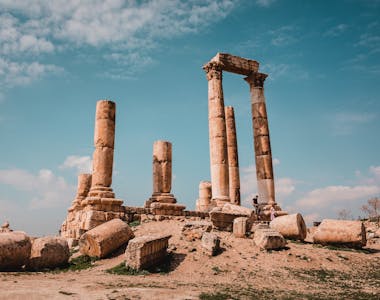

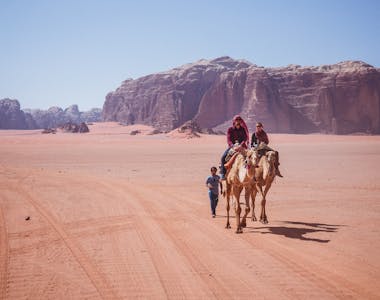
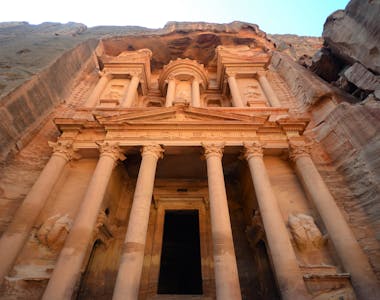
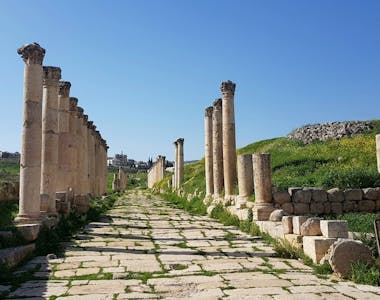
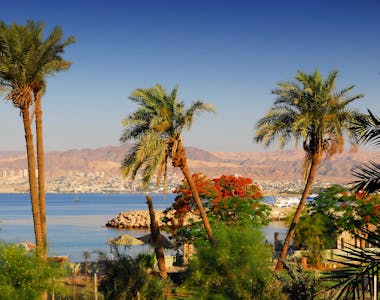

Book With Confidence
Monthly Payments
Spread the costs with no interest or additional fees
Best Price Guarantee
We won't be beaten on price. If you find this adventure at a lower price please get in touch!
Reserve now & pay later
Reserve your adventure today and pay later, free of charge
ATOL protected
Book with confidence
Hold your space today, for free
or book your trip with a deposit and then pay the rest in instalments.
Reserve your flights with us
Add flights to your booking and we'll take care of the rest. You'll get 24/7 support from our team & ATOL protection.
Speak to our experts
Call or email our expert team to find out more and help with ideas and planning.









